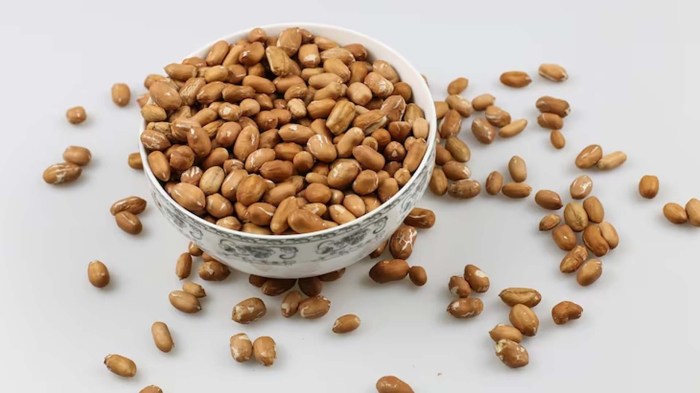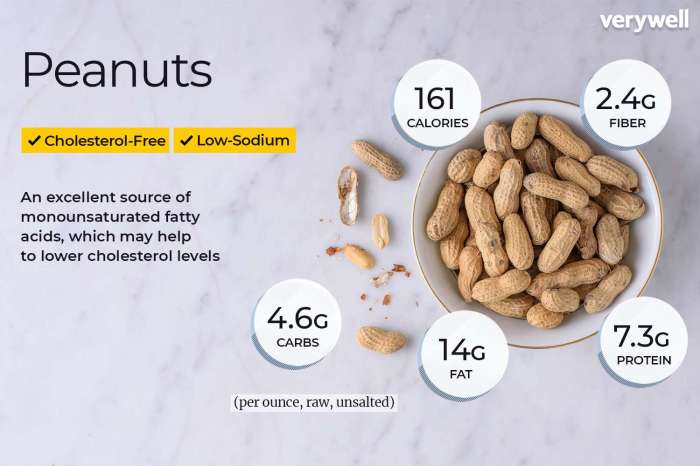
Nutritional Composition of 100g Peanuts: 100 Gm Peanuts Nutrition Facts

100 gm peanuts nutrition facts – Peanuts are a nutritionally dense food, offering a good balance of macronutrients and a variety of micronutrients. Understanding their nutritional profile can help individuals make informed choices about incorporating them into a balanced diet. This section details the macronutrient and micronutrient composition of a 100g serving of peanuts.
Macronutrient Breakdown of 100g Peanuts, 100 gm peanuts nutrition facts
The following table provides a detailed breakdown of the macronutrients – protein, carbohydrates, and fats – found in a 100g serving of peanuts. These values are approximate and can vary slightly depending on the type of peanut and growing conditions.
| Nutrient | Amount (grams) | Amount (% Daily Value) | Unit |
|---|---|---|---|
| Protein | 26 | 52% | g |
| Carbohydrates | 16 | 6% | g |
| Total Fat | 50 | 77% | g |
Fat Composition of 100g Peanuts
Peanuts are a significant source of dietary fats, primarily unsaturated fats, which are considered beneficial for heart health. The fat composition is roughly as follows: The majority of the fat in peanuts is unsaturated, contributing to their nutritional value. Specific amounts can vary.
- Monounsaturated Fats: Approximately 45% of total fat. These fats are associated with reduced risk of heart disease.
- Polyunsaturated Fats: Approximately 25% of total fat. This includes linoleic acid, an essential fatty acid.
- Saturated Fats: Approximately 16% of total fat. While saturated fats should be consumed in moderation, peanuts’ overall unsaturated fat profile makes them a relatively healthy fat source.
Micronutrient Content of 100g Peanuts
Peanuts are also a good source of several essential vitamins and minerals that contribute to overall health and well-being. The following list highlights some key micronutrients and their associated benefits.
Understanding the nutritional profile of 100 gm of peanuts reveals a good source of protein and healthy fats. Comparing this to the carbohydrate content found in other staples, such as checking out the sliced bread nutrition facts , helps contextualize peanut’s place in a balanced diet. Ultimately, both 100 gm peanuts and bread offer distinct nutritional benefits, contributing differently to overall dietary needs.
Peanuts offer a range of micronutrients that contribute to various bodily functions. These nutrients play vital roles in maintaining optimal health.
- Vitamin E: A potent antioxidant that protects cells from damage caused by free radicals. A 100g serving provides a significant portion of the daily recommended intake.
- Magnesium: Essential for muscle and nerve function, blood sugar control, and blood pressure regulation. Peanuts are a good source of this vital mineral.
- Manganese: Plays a role in bone health, wound healing, and metabolism. A 100g serving of peanuts contains a considerable amount of manganese.
- Phosphorus: Crucial for bone health, energy production, and cell signaling. Peanuts contribute to the daily phosphorus requirement.
- Potassium: Important for maintaining healthy blood pressure and fluid balance within the body. Peanuts provide a modest amount of potassium.
- Biotin (Vitamin B7): Essential for cell growth and metabolism. Peanuts are a good source of biotin.
- Niacin (Vitamin B3): Contributes to energy production and DNA repair. Peanuts are a notable source of niacin.
Health Benefits Associated with Peanut Consumption (100g)
Consuming 100g of peanuts can offer a range of health benefits, primarily due to their rich nutrient profile including healthy fats, protein, fiber, and various vitamins and minerals. These benefits extend to several aspects of overall well-being, impacting cardiovascular health, blood sugar management, weight control, and gut health. It’s important to remember that these benefits are part of a balanced diet and lifestyle, and individual responses may vary.
Cardiovascular Health Benefits of Peanuts
Peanuts are a good source of monounsaturated and polyunsaturated fats, which are beneficial for cardiovascular health. These healthy fats can help lower LDL (“bad”) cholesterol levels and raise HDL (“good”) cholesterol levels, reducing the risk of heart disease. Furthermore, peanuts contain antioxidants, such as vitamin E, which help protect against oxidative stress and inflammation, both contributing factors to cardiovascular disease.
Studies have shown a correlation between regular peanut consumption and a reduced risk of coronary heart disease. The fiber content also contributes to overall cardiovascular health by aiding in cholesterol management and promoting healthy blood pressure.
Peanuts and Blood Sugar Management
Despite their caloric density, peanuts can play a beneficial role in blood sugar management. The combination of healthy fats, protein, and fiber in peanuts leads to a slower release of glucose into the bloodstream after consumption, preventing sharp spikes in blood sugar levels. This is particularly important for individuals with type 2 diabetes or those at risk of developing the condition.
The fiber content helps regulate blood sugar by slowing down digestion and absorption of carbohydrates. However, moderation is key, as excessive consumption of any food, including peanuts, can impact blood sugar levels.
Peanuts and Weight Management
While peanuts are calorie-dense, studies suggest they may not contribute to weight gain as much as other calorie-dense foods. This is likely due to their high protein and fiber content, which promote satiety and reduce overall calorie intake. Research indicates that individuals who include peanuts in their diet as part of a balanced eating plan may experience better weight management outcomes than those who exclude them.
The feeling of fullness from peanuts can help curb cravings and prevent overeating. However, portion control remains crucial for weight management.
Gut Health Benefits of Peanuts
Peanuts contain prebiotics, which are types of fiber that feed beneficial bacteria in the gut. These beneficial bacteria play a crucial role in maintaining a healthy gut microbiome, supporting digestion, and boosting immunity. A healthy gut microbiome is linked to numerous health benefits, including improved digestion, reduced inflammation, and enhanced immune function. The fiber in peanuts also contributes to regular bowel movements, preventing constipation.
| Benefit | Description | Supporting Evidence Type | Reference Source (if available) |
|---|---|---|---|
| Improved Cardiovascular Health | Reduces LDL cholesterol, increases HDL cholesterol, reduces inflammation. | Observational studies, meta-analyses | Numerous studies published in journals like the American Journal of Clinical Nutrition. |
| Blood Sugar Regulation | Slows glucose absorption, prevents blood sugar spikes. | Clinical trials, observational studies | Diabetes Care, Journal of the American Medical Association. |
| Weight Management Support | Promotes satiety, may reduce overall calorie intake. | Randomized controlled trials, observational studies | Obesity, The American Journal of Clinical Nutrition. |
| Enhanced Gut Health | Provides prebiotics, supports beneficial gut bacteria, improves digestion. | In vitro studies, animal studies, human studies | Gut, Nutrition Reviews. |
Incorporating Peanuts into a Balanced Diet

Incorporating peanuts into your diet can be a delicious and nutritious way to boost your intake of healthy fats, protein, and fiber. However, mindful consumption and balanced meal planning are key to reaping the benefits without exceeding recommended daily calorie intake. The following sections will offer practical guidance on seamlessly integrating peanuts into a variety of meals and dietary patterns.
Sample Meal Plans Incorporating 100g of Peanuts
The following meal plans demonstrate how 100g of peanuts can be incorporated into a balanced diet, showcasing different methods of consumption and considering portion control. Remember to adjust these plans based on your individual dietary needs and preferences.
- Meal Plan 1: Peanut Butter Focus
Breakfast: Oatmeal with 2 tablespoons peanut butter and sliced banana. Lunch: Salad with grilled chicken, mixed greens, and 1 tablespoon peanut butter dressing. Dinner: Lentil soup with a side of whole-wheat bread and 1 tablespoon peanut butter. - Meal Plan 2: Snack-Focused Approach
Breakfast: Yogurt with berries and a small handful of peanuts. Lunch: Turkey and avocado sandwich on whole-wheat bread. Dinner: Salmon with roasted vegetables and a small bowl of peanuts as a snack. - Meal Plan 3: Peanut-Infused Dishes
Breakfast: Smoothie with peanut butter, spinach, banana, and almond milk. Lunch: Chicken stir-fry with peanuts and brown rice. Dinner: Peanut noodle salad with tofu and vegetables.
Recipes Utilizing 100g of Peanuts
These recipes provide examples of how 100g of peanuts can be creatively incorporated into both savory and sweet dishes. Remember that 100g of peanuts is roughly 1 cup of shelled peanuts or 1/2 cup of peanut butter. Adjust ingredient quantities as needed to accommodate your specific needs.
- Savory: Peanut Noodles
This dish features a flavorful peanut sauce coating noodles and vegetables. The sauce is created by blending roasted peanuts, soy sauce, rice vinegar, honey, garlic, ginger, and sesame oil. The noodles and vegetables can be customized to your preference, offering versatility and nutritional balance. - Sweet: Peanut Butter Cookies
A classic recipe that incorporates peanut butter as the primary ingredient. These cookies provide a satisfying sweet treat while still offering some nutritional value from the peanuts. Variations include adding chocolate chips, oats, or other ingredients for added flavor and texture.
Integrating Peanuts into a Healthy Eating Pattern
Successfully integrating peanuts into a healthy eating pattern involves considering portion control, mindful snacking, and choosing complementary foods. By incorporating peanuts as part of a balanced meal plan rich in fruits, vegetables, lean protein, and whole grains, you can enjoy the nutritional benefits of peanuts while maintaining a healthy weight and overall well-being. Remember that moderation is key, and excessive peanut consumption can lead to increased calorie intake.
Paying attention to your body’s signals of fullness is crucial for maintaining a healthy relationship with food, including peanuts.
FAQ Resource
Are peanuts a good source of fiber?
Yes, peanuts are a moderate source of dietary fiber, contributing to digestive health.
Can I eat peanuts if I have a nut allergy?
No, peanuts are legumes, not true nuts, but they can trigger severe allergic reactions in individuals with peanut allergies. Avoid consumption if you have a known allergy.
How many peanuts are in 100 grams?
The number of peanuts in 100 grams varies depending on the size of the peanuts. Approximately, it would be around 60-80 peanuts.
Are roasted peanuts healthier than raw peanuts?
Roasting peanuts can alter their nutritional profile slightly, often increasing their fat content and potentially reducing some micronutrients. Raw peanuts generally retain more nutrients.